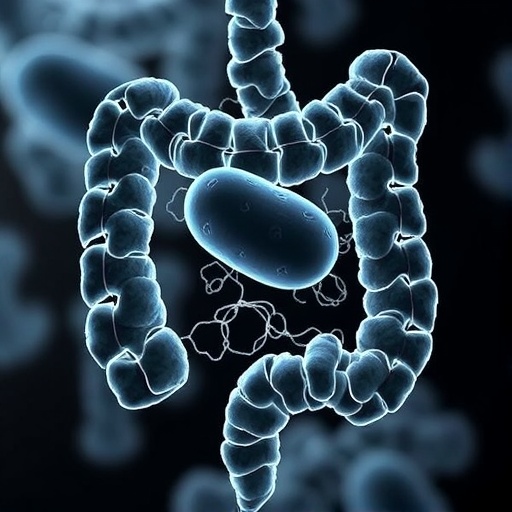A groundbreaking study from researchers at Kyoto Prefectural University of Medicine alongside prominent Japanese collaborators has unveiled a compelling link between colibactin-producing Escherichia coli (pks+ E. coli) and heightened colorectal cancer risk in patients with familial adenomatous polyposis (FAP). This genetic condition, characterized by numerous precancerous polyps in the colon, notoriously predisposes individuals to colorectal cancer at an early age. The new findings lend critical insight into the role that gut microbiota, especially specific bacterial strains, may play in exacerbating cancer risk in genetically vulnerable populations.
The study meticulously examined tissue samples derived from colon polyps and adjacent mucosal areas in a cohort of 75 FAP patients, all of whom had not yet undergone colectomy procedures. By preserving the natural gut microbial landscape, the research team was able to directly analyze the colonization patterns of pks+ E. coli within the native intestinal environment of affected individuals. Their analyses revealed a significant prevalence of this bacterium in colon polyps, with a noted higher occurrence in smokers, suggesting lifestyle factors may further influence microbial colonization dynamics.
Intriguingly, patients who had already undergone colorectal surgery exhibited a complete absence of pks+ E. coli, underscoring the critical role of an intact gut microbiota in maintaining colonization by this pathogen. This observation hints at the possibility that surgical interventions may disrupt microbial niches, which could inadvertently impact the bacterial populations implicated in carcinogenesis. Such a finding may open avenues for microbial targeted therapies to accompany surgical or pharmacological interventions in FAP treatment paradigms.
In terms of clinical implications, the study reported that FAP patients harboring pks+ E. coli were over three times more likely to have a prior history of colorectal cancer compared to those without the bacterium. This statistic conveys a robust association between bacterial colonization and tumor development, implying that the presence of this toxin-producing microbe might accelerate carcinogenic processes in already susceptible colonic tissue. These findings challenge the conventional gene-centric view of hereditary cancers by integrating the influential role of gut bacteria.
From a molecular perspective, adenomatous tissues infected with pks+ E. coli exhibited pronounced DNA damage alongside elevated inflammatory markers, including interleukin-6 (IL-6), a cytokine known for its role in promoting inflammation and cancer progression. The bacterial metabolite colibactin is believed to mediate DNA alkylation and crosslinking, producing genotoxic stress that may trigger mutagenic cascades within epithelial cells. This duo of DNA insults paired with a heightened inflammatory milieu potentially fosters an environment conducive to malignant transformation.
Colibactin’s mechanistic involvement highlights the complex interplay between microbial metabolism and host cellular physiology. By producing this genotoxin, pks+ E. coli manipulates host biology at multiple levels, inducing DNA strand breaks while simultaneously recruiting immune elements through cytokine signaling pathways. Such a dual-hit mechanism exemplifies how microbes can synergize with genetic predispositions to compound colorectal cancer risk, especially in syndromes marked by inherent genomic instability like FAP.
This research represents one of the first comprehensive investigations to probe the microbiota landscape of FAP patients prior to surgical intervention. By capturing the native microbial ecosystem within these polyps, researchers offer a rare window into how endogenous bacteria might modulate tumor initiation and progression. Furthermore, the study’s integrative approach combining histopathology, molecular assays, and microbiological detection marks a technical advance in exploring cancer-microbiome interactions with precision.
Despite its pioneering nature, the study acknowledges limitations, primarily the relatively small sample size and single-center design. Larger, multicenter cohorts will be necessary to validate and generalize the findings across diverse populations. Additionally, longitudinal studies could determine whether pks+ E. coli colonization precedes cancer onset or emerges as a consequence of neoplastic transformation, thereby clarifying causality versus correlation.
The potential clinical ramifications of linking pks+ E. coli to colorectal carcinogenesis in FAP patients are manifold. Future strategies might include microbiome-targeted interventions such as probiotics engineered to outcompete harmful strains, bacteriophage therapies that selectively eradicate colibactin producers, or precise antibiotic regimens designed to minimize disruption of beneficial gut flora. Screening tools detecting pks+ E. coli in fecal or mucosal samples could offer a non-invasive method to identify high-risk individuals requiring intensive surveillance.
Moreover, therapeutic research could focus on developing agents capable of neutralizing colibactin or its DNA-damaging effects, alleviating inflammation, or enhancing DNA repair mechanisms within at-risk colonic epithelium. Such modalities would complement existing surgical and chemopreventive approaches, creating a multi-pronged attack on colorectal tumorigenesis in hereditary syndromes.
The broader scientific community has increasingly recognized gut microbiota as a key factor influencing not only gastrointestinal health but also systemic diseases, including cancer. This study enriches this perspective by providing mechanistic evidence that specific bacterial metabolites can induce genomic insults, driving oncogenesis in genetically predisposed individuals. It is a paradigm-shifting concept that redefines cancer etiology as a product of gene-environment-microbe interactions.
Overall, this meticulous investigation opens new horizons in precision medicine for colorectal cancer prevention. By integrating microbiome analysis into risk stratification models for FAP, clinicians may soon tailor interventions not only based on genetic mutations but also microbial profiles. Such personalized medicine approaches promise to enhance early detection, mitigate progression, and improve outcomes for hereditary colorectal cancer patients worldwide.
As research progresses, interdisciplinary efforts combining microbiology, oncology, genomics, and immunology will be essential to unlock the full therapeutic potential embedded within the cancer-microbiome axis. The findings from Kyoto Prefectural University of Medicine constitute a crucial step along this path, signaling a future where managing microbial influences becomes standard practice in combating hereditary malignancies.
Subject of Research: The role of colibactin-producing Escherichia coli in colorectal carcinogenesis among familial adenomatous polyposis patients.
Article Title: Contribution of colibactin-producing Escherichia coli to colonic carcinogenesis
News Publication Date: Not explicitly stated; inferred 2025 from citation.
Web References: http://dx.doi.org/10.1136/egastro-2024-100177
References: Ishikawa H, Aoki R, Mutoh M, et al. Contribution of colibactin-producing Escherichia coli to colonic carcinogenesis. eGastroenterology 2025;3:e100177. doi:10.1136/egastro-2024-100177
Image Credits: By Hideki Ishikawa, Ryogo Aoki, Michihiro Mutoh, et al.
Keywords: Colorectal cancer, Gut microbiota




